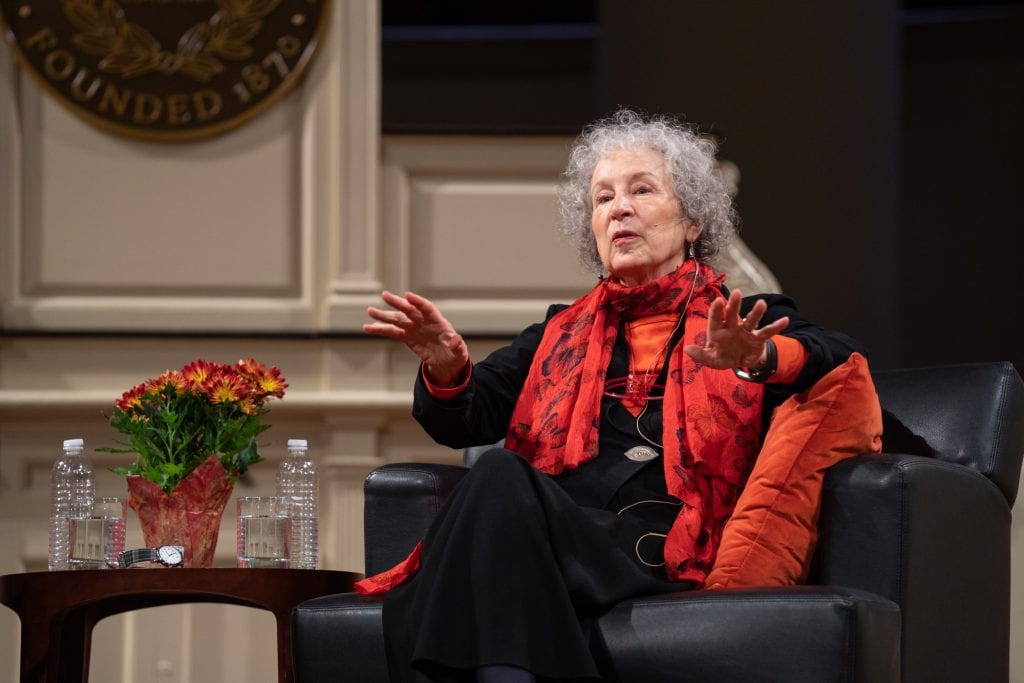Margaret Atwood discusses literature and equality at Hendricks Chapel
Atwood discusses literature, equality at SU

Celebrated Author Margaret Atwood answered questions before a packed audience in Hendricks Chapel on Thursday evening. The event was part of the University Lectures and Syracuse Symposium series, and Atwood was interviewed by Dana Spiotta, an associate professor of English in SU’s College of Arts and Sciences.
Throughout her career spanning over 50 years, Atwood has published over 40 works of literature, including novels, books of poetry and short story collections. Atwood received critical acclaim for novels such as The Handmaid’s Tale and Alias Grace, both of which were made into TV series. She is the recipient of the Man Booker Prize, among many other accolades.
The interview opened with a discussion about Atwood’s upbringing in the Canadian woods without electricity and running water, and the influence of science on her writing. Atwood’s father was an entomologist and her brother is a neurophysiologist. Her novel, Oryx and Crake, involves some of these scientific and biological themes.
Atwood said that growing up, there weren’t any creative writing schools and few well known Canadian writers.
“Everyone thought I was a lunatic for wanting to be a writer, but they thought I would grow out of it,” Atwood said.
Atwood said growing up in the woods helped her develop the ability to concentrate. Writing by the light of a kerosene lantern while sitting with other people helped her develop the skill to focus on her own work.
Atwood also discussed the ways she has always sought to stand up against totalitarian censorship. Atwood helped found the English chapter of PEN Canada, an organization that assists jailed and oppressed writers.
“Support PEN America,” Atwood said. “You can do it. And by the way, why don’t you vote this time?” Atwood said, and was met with laughter and applause from the audience.
Atwood noted that her novel, The Handmaid’s Tale, which was originally published in 1985, sought to answer the question of what a totalitarian government would look like in the United States. The novel features a rigid theocracy, and Atwood noted that religion seemed to her to be the answer for what people would support in sufficient numbers in a U.S. totalitarianism.
“It may be a bit of a mistake to put God on the money,” she said.
Atwood said that all the details in the totalitarian regime in The Handmaid’s Tale are based upon real laws and practices from history, such as laws about styles of clothing throughout European history and the oppression of women, including at the hands of other women. Atwood also noted that in these totalitarian regimes, there were always people who worked to undermine and resist.
“Unfortunately, with our improved surveillance tools, that’s becoming more difficult,” she added.
Atwood also discussed her desires for more equitable distributions of wealth and power, including gender equality. She said she wants to live in a world that’s fair to both women and men.
“The more gender equality there is in a society the less abuse there is,” Atwood said. “Because abuse has to do with a lack of respect. And lack of respect has to do with inequality.”
When asked by an audience member about a line in The Handmaid’s Tale, “Nolite te bastardes carborundorum,” or “Don’t let the bastards grind you down,” Atwood said it’s important to not allow yourself to think you’re being ground down. Atwood added she recalls people saying that President Trump being elected into office is the worst thing to ever happen. However, she noted the fact that we can discuss these issues openly proves that there are worse things that could happen.
“Part of it is just your inner resolve,” Atwood said. “But another part of it is not trying to take on more than you possibly can. So pick something that is small enough and plausible enough for you actually to do, like voting.”





